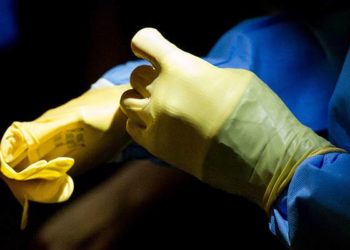High volume injections not found to be an effective treatment for chronic Achilles tendinopathy
1. High volume fluid injections are not effective for treatment of chronic Achilles tendinopathy, including for pain and activity levels, in the intermediate-term.
Evidence Rating Level: 1 (Excellent)
Achilles tendinopathy, most commonly occurring in the midportion, is a frequently seen overuse injury for which initial management involves exercise combined with load management. Many of these patients however continue to have symptoms years after diagnosis and one-third of non-responders require surgery, necessitating the need for early, conservative therapy. Patients with chronic Achilles tendinopathy are observed to have neovascularization and infiltration of nerves. These physiological changes are suggested to play a role in the chronic pain component of this condition and previous studies have shown an association between ultrasound Doppler flow of the neovascularized vessels and patient-reported severity of symptoms. Recently, a novel technique of injecting high volumes of fluid (saline and lidocaine) with or without corticosteroids has been used based on the theory that large fluid volume will destroy neovascularization. Studies have shown symptom improvement in the short term (6-12 weeks) but not as much in the intermediate term and have been cohort studies or randomised controlled trials (RCTs) with low sample size. In this double-blind, placebo-controlled single-centre RCT, 80 adults with chronic midportion Achilles tendinopathy were randomised 1:1 to either high volume injection (50 mL total) or placebo (2 mL total) of a 4:1 ratio of 0.9% sodium chloride to 1% lidocaine. Patients had to have undergone a minimum of six weeks of exercise treatment which did not reach a satisfactory outcome, had painful Achilles tendon swelling, and detectable Doppler flow (either intratendinous or peritendinous). Patients were stratified according to pre-injury activity levels and were continued on exercise programs. Primary outcome was the VISA-A questionnaire (Victorian Institute of Sports Assessment-Achilles for measuring pain and activity) at 24 weeks and secondary outcomes were patient satisfaction, return to sport, degree of ultrasonographic Doppler flow, visual analogue scale on 10 hop test, power and flexibility of gastrocnemius and soleus muscles, pain detect questionnaire and pain coping inventory. Both high volume and placebo injections significantly improved VISA-A scores at 24 weeks (40.4, 95% CI 32.0-48.7 to 59.1, 95% CI 47.9-69.1 and 36.9, 95% CI 27.1-46.8 to 58.5, 95% CI 47.9-69.1) however there was no statistically significant difference between the groups (0.5 points, 95% CI -17.8 to 18.8). Similarly, none of the secondary outcomes showed statistically significant difference between the two groups at 24 weeks. However, Doppler flow assessment of the patients who had intratendinous neovascularization (n=33 in high volume, n=37 in control) showed successful disappearance of flow significantly more in the high volume group (26/33) than the control group (11/37) (p<0.001) but this successful procedural effect was not seen in any of the outcomes. The results of this study suggest there is no benefit of high volume fluid injection for patients with chronic Achilles tendinopathy.
Click to read the study in BMJ
Image: PD
©2020 2 Minute Medicine, Inc. All rights reserved. No works may be reproduced without expressed written consent from 2 Minute Medicine, Inc. Inquire about licensing here. No article should be construed as medical advice and is not intended as such by the authors or by 2 Minute Medicine, Inc.




![2MM: AI Roundup- AI Cancer Test, Smarter Hospitals, Faster Drug Discovery, and Mental Health Tech [May 2nd, 2025]](https://www.2minutemedicine.com/wp-content/uploads/2025/05/Untitled-design-350x250.png)




